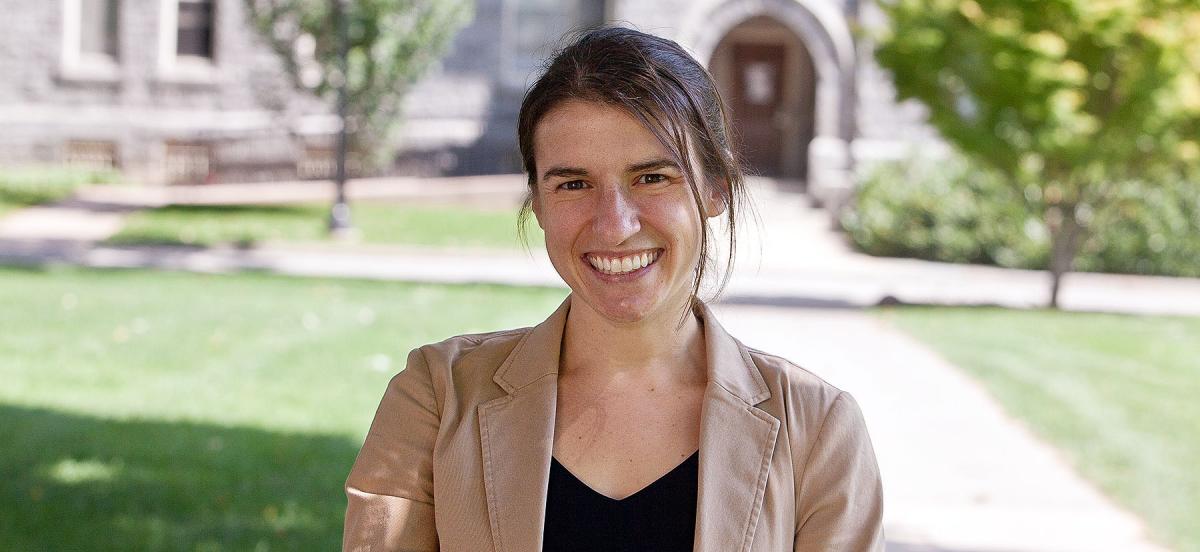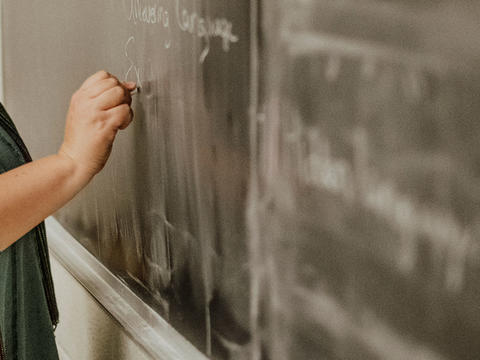Lou Charkoudian '03 Awarded National Institutes of Health Grant

Lou Charkoudian '03. Photo by Brad Larrison.
Details
The assistant professor of chemistry will use the $390,344 grant to further her research on understanding acyl carrier protein binding in bacteria.
Over half of all antibiotics and anticancer agents on the market today are derived from molecules produced by plants, bacteria, and fungi. In her lab at Haverford, Assistant Professor of Chemistry Lou Charkoudian '03 studies the very complex protein-based molecular assembly lines—known as synthases—that bacteria use to produce those natural products that are used as pharmaceuticals in the hopes of helping to create medicines and fuels from renewable sources.
"I’m interested in understanding how humans can collaborate with bacteria to better human health and the environment," she says. "Nature has evolved for eons to establish remarkably simple routes to make very complicated molecules. Many of the molecules found in nature are too structurally complex to be synthesized by humans in the laboratory. I want to elucidate nature’s strategies so that we can harness this information in the laboratory setting."
Charkoudian's latest collaboration with Associate Professor of Chemistry Casey Londergan, "Functional Hybrid Natural Product Synthases by Tracking Acyl Carrier Protein Binding and Conformational Dynamics," recently received a $390,344 grant from the National Institutes of Health (NIH) to research the role of one particularly important, fast-moving, yet very small protein within the synthase.
"This acyl carrier protein acts like a delivery truck to transport substrates, intermediates, and products to the different stops on the assembly line," says Charkoudian. "But it moves so quickly, that its motions are hard to track. [Associate Professor of Chemistry] Casey Londergan and I developed a method to track the fast and transient motions of the acyl carrier protein at previously inaccessible resolution. This grant will fund our efforts to use this new method to understand how the acyl carrier protein moves and communicates with its partners within a synthase. Ultimately, we hope to use this information to formulate a set of ground rules for designing functional hybrid synthases to make new molecules."
The NIH grant will fund the work of a fulltime research assistant in the Charkoudian and Londergan labs and six undergraduate summer researcher stipends for the next three years, as well as new, state-of-the-art equipment to help purify proteins and molecules. It will also help procure materials and reagents for the research.
"This grant will enable the Charkoudian and Londergan research labs to make rapid progress on a very challenging project," says Charkoudian. "The methods involved in this project are highly collaborative and time consuming, so having a fulltime research assistant working on our team will provide continuity and a regular presence in the lab. In turn, this will help us involve more undergraduate students in the research."
Six Haverford chemistry students—Matt Johnson '14, Connie Friedman '15, Emily Winesett '16, Katie Tsai '16, Grace Thiele '17, and Sam Epstein '19—acquired the data that Charkoudian and Londergan used in their grant proposal to the NIH. And four Fords—Thiele, Michael Jordan '17, Vaso Chioti '18, and Epstein—will work on this project as part of their senior theses.
The work is highly interdisciplinary, involving techniques and approaches of all of the branches of the natural sciences, so some of the research will also be conducted in the lab of Biology Professor Rob Fairman and at the University of Bristol in the U.K.
-Rebecca Raber



